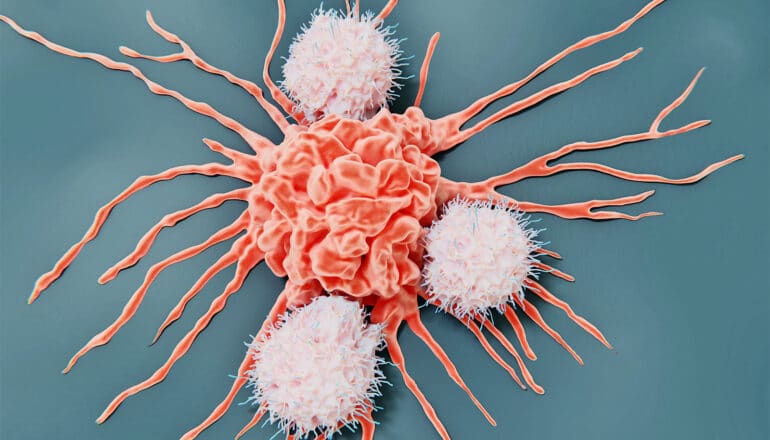
Researchers have uncovered a way to make a type of white blood cells known as natural killer cells—which kill infected, damaged, or malignant cells in the body — more effective against cancer.
The approach, they say, could enable new treatments for solid tumors in the future.
The findings appear in Nature Biotechnology.
CAR-T cell therapy is a treatment that was approved by the US Food and Drug Administration in 2017 that boosts the cancer-killing ability of immune cells called T cells. For the therapy, T cells are taken from a patient’s blood, genetically modified to better recognize cancer cells, and returned to the patient.
While this therapy has been effective for treating blood cancers and offers another option for patients who’ve had little success with other treatments, however, it has downsides.
“It can be very toxic,” says Sidi Chen, associate professor of genetics at Yale School of Medicine and senior author of the new study. “Many patients experience severe side effects of CAR-T such as cytokine release syndrome, which can make them very sick or even kill them.”
CAR-T cell therapy is also patient-specific in that a patient’s own T cells have to be used.
But a novel treatment known as CAR-NK therapy, which uses natural killer cells rather than T cells, is now undergoing clinical trials and it addresses some of CAR-T cell therapy’s shortcomings. It’s similarly effective, much safer, and can be made with donor natural killer cells, meaning it can be “off the shelf” and used in many patients rather than made specifically for each individual.
“But the limitation is that CAR-NK cells cannot efficiently get into solid tumors, like breast or colorectal tumors,” says Chen, who is also a member of Yale Systems Biology Institute on Yale West Campus and the Yale Cancer Center. “They’re not effective against them.”
Cellular checkpoints are genes that prevent a cell from becoming overly active. They’re essentially the cell’s brakes, says Chen. For the new study, the researchers, led by Lei Peng, a postdoctoral fellow in Chen’s lab and first author of the study, set out to find natural killer cell checkpoints that could be targeted in order to boost the cells’ activity in tumors. In other words, they wanted to find the brakes and turn them off to see if that might help the cells infiltrate solid tumors.
They did this by knocking out—or deactivating—thousands of genes in natural killer cells, putting those mutant cells into mice with four different types of tumors (melanoma, breast cancer, glioblastoma, and pancreatic cancer) and identifying which mutants were able to infiltrate and accumulate in the tumors. Several mutants were able to do so, which revealed a number of checkpoints that might serve as targets to improve CAR-NK therapy.
Following a series of experiments and analyses, including genetic screening and single cell profiling, the researchers were able to home in on one checkpoint in particular, a gene called CALHM2. They then knocked out CALHM2 in natural killer cells and observed how the cells behaved in the tumor environment.
“We found that knocking out CALHM2 made natural killer cells more potent in terms of cancer-killing, more efficient in terms of infiltrating the tumor, and more efficient in producing anti-tumor cytokines, proteins that are key to immune system cell signaling,” says Chen. “And this was true across multiple cancer types.”
Knocking out CALHM2 also made CAR-NK therapy effective against colorectal tumors in animal models of cancer, the researchers found.
“When we introduced typical CAR-NK therapy to a colorectal tumor, it did nothing,” says Chen. “But when we did the therapy with cells without CALHM2, all of the sudden it worked miraculously. It showed CALHM2 is a targetable checkpoint.”
The researchers also reintroduced CALHM2 to cells in which it had been knocked out, which reduced the cells’ anti-cancer activity. And the more of the gene that was introduced, the more activity was suppressed. This opposite approach could be a model for treating autoimmunity, says Chen, reducing activity of harmfully overactive cells.
Going forward, Chen and his lab are working to clarify why it is that CALHM2 has the effect it does and are taking steps towards a clinical trial for the therapy.
“We also want to extend the applicability of this approach to even more disease models,” says Chen.
The research was primarily funded by the National Institutes of Health and the US Department of Defense.
Source: Mallory Locklear for Yale
The post Tweak makes ‘natural killer cells’ more effective against cancer appeared first on Futurity.
from Futurity https://ift.tt/DYlrX5J
No comments:
Post a Comment